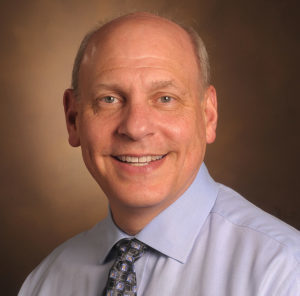Five Questions with Vanderbilt Educator, Neil Osheroff, Ph.D.

Neil Osheroff received his Ph.D. in Biochemistry and Molecular Biology from Northwestern University and was a Helen Hay Whitney Foundation Fellow at the Stanford University School of Medicine. He is currently a Professor of Biochemistry and Medicine at the Vanderbilt University School of Medicine and holds the John G. Coniglio Chair in Biochemistry. Dr. Osheroff directs a research laboratory that has made seminal contributions to our understanding of how enzymes, known as topoisomerases function, regulate the topological state of DNA and serve as targets for several widely prescribed anticancer and antibacterial drugs. Beyond his research program, he is committed to educating the next generation of health professionals and is very interested in curricular design and integration, assessment, and the professional development of medical science educators. He has been a course director in the School of Medicine since 1990 and was one of four faculty members who were tasked with developing and implementing a highly integrated pre-clerkship phase of the medical curriculum as part of a major revision in 2013. He currently serves as one of the two faculty co-leaders of the pre-clerkship phase and chairs the phase’s teaching team. He also directs the School of Medicine Academy for Excellence in Education and chairs the Master Science Teacher group.
Internationally, Dr. Osheroff is a Past-President of the Association of Biochemistry Educators and sits on the Steering Committee of the Asia-Pacific Biomedical Science Educators Association. He currently serves as the President of the International Association of Medical Science Educators (IAMSE).
Dr. Osheroff has received awards for mentoring, teaching, curricular design, educational leadership and service, and promoting diversity and inclusion. He was inducted as a Fellow of the American Association for the Advancement of Science in 2018 and received the IAMSE Distinguished Career Award for Excellence in Teaching and Educational Scholarship in 2019. He has published over 260 papers and has presented more than 300 scientific and educational talks in 32 different countries.
What does it mean to be an educator here at Vanderbilt?
It means the world to me personally. I am very proud of the accomplishments that we have made in the medical curriculum and in the educational culture in the School of Medicine. The educational community here is rich and very supportive and the School of Medicine has provided straightforward pathways for leadership, promotion, and recognition. Vanderbilt is very well known in the world of medical education and I believe that it is an institution in which educators can thrive and have a fulfilling career.
What are the most important innovations or trends in education?
Education is going through a very innovative period. Curricular integration has had a wealth of positive effects on how we teach our students and how we function and thrive as educators. Integration has required the use of teaching teams, which has led to the development of a community of educators (as compared to a collection of individuals or discipline-based silos). The move to competency-based assessment has led to a more holistic review of our students as well as the greater use of feedback (which has had major positive effects on learner development). The use of technology has also affected the way that we train our students.
How has the role of educators changed over the years?
The role of educators has changed dramatically over the past 2-3 decades. We have evolved from “teachers,” who were primarily information providers, to “educators,” who have numerous additional roles, such as leader, curricular developer, mentor, assessor, and scholar. Many individuals are now approaching their educational pursuits in much the same manner as they approached their scientific research, and are using the same creative skills, rigor, and scholarship. Our opportunities have expanded greatly and while our roles have become considerably more challenging, they are also considerably more fulfilling. Although “teachers” were generally known only locally (and potentially only within their departments), many Vanderbilt “educators” are now known and highly respected throughout the School of Medicine. Several also have reputations and leadership roles at the national and international levels and are profoundly affecting education and educators well beyond the borders of Vanderbilt.
Is there a specific piece of educational literature or resource that was particularly influential to you?
I believe that the work of Dr. Nikki Woods (who is a cognitive psychologist) on integration has had a profound influence on my teaching. Her early work demonstrated that the more you can teach “in context,” the more cognitive connections your learners make with the material, and the better they retain the information. Her later work demonstrated that integration does not happen merely by juxtaposing different disciplines – it only takes place when (for example) clinical medicine and foundational science are consciously taught side-by-side on a minute-by-minute basis. True integration is difficult to accomplish, but Dr. Woods’ research has shown significant benefits to learners who are taught in an integrative manner. I would note that Dr. Woods will be giving the Chapman Lecture in the School of Medicine on April 20, 2020.
What experiences or resources should junior scientists seek out for a career in education?
I would urge junior scientists who are seeking a career in education to talk with more experienced educational faculty members. We are a resource and can help provide information that ranges from practical teaching techniques to career advice. All of the senior educators who I know are happy to help mentor the next generation. If you are struggling to figure out individuals who may be able to help, check the website (https://www.vumc.org/aet/welcome) of the Vanderbilt Academy for Excellence in Education for a list of members.
Leave a Response